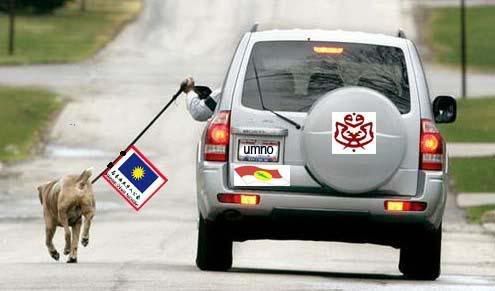
MCA deputy publicity chief Loh Seng Kok (centre) highlights non-Muslim frustration with government officials who continue to deter initiatives for religious activities in national schools. — Picture by Jack Ooi
KUALA LUMPUR, July 23 — Students, parents, teachers and religious representatives are complaining of a systematic effort by education officials to frustrate their initiatives to hold religious activities in national schools, despite a decade-old Education Ministry guide allowing non-Muslim societies in schools.
More have now stepped forward to report the “illegal” dissolution of non-Muslim religious clubs in schools following a newspaper report earlier this month highlighting such an incident at Klang High School.
Today, several Buddhist and Christian religious representatives called on the Najib administration not to neglect the spiritual well-being of the non-Muslim community, at an MCA press conference here.
They reminded the Cabinet to stop dragging its feet over the long-standing issue and to take immediate steps to correct confusion — deliberate or otherwise — over the education ministry’s stand promoting holistic religious education for the nation’s future.
“Today’s meeting is not the first time,” MCA deputy publicity chief, Loh Seng Kok, told reporters, describing his talks earlier with parents and religious representatives, including from the Young Buddhists’ Association of Malaysia (YBAM), Buddhist Association of Subang Jaya and the Christian Federation of Malaysia (CFM).
Loh added the issue had also been raised at his party’s presidential council meeting earlier this year, where MCA Youth Chief, Datuk Seri Wee Ka Siong, who is also the Deputy Education Minister had been quizzed, but admitted “there has been no reply from Cabinet” to date.
Malaysia’s reputation for religious harmony took a beating earlier this year, following attacks on several houses of worship after a court ruling allowed the Catholic Church to publish the word “Allah” outside the Muslim context.
Father of three, Chin Fook Khiang, disclosed to
The Malaysian Insider that Klang High was not the only public school to have shut down its non-Muslim religious clubs.
The 53-year-old said SMK SS17 in Subang Jaya, Selangor, had without warning ordered the school’s Buddhist Society and Christian Fellowship to stop holding meetings and carrying out religious activities in January last year, stunning students and parents alike.
The two non-Muslim religious clubs had been running for nearly 15 years, since the school was established, but were suddenly ordered to disband ostensibly because they were not registered with the state education department.
Chin added it was not the first time education authorities had tried to shut down non-Muslim religious activities in the school, and related an attempt in 2005 by a district education officer to close the Christian and Buddhist clubs for the same reasons, but added it had been foiled by the previous school head.
The school’s then-headmaster, Ahmad Akim, had defended the two clubs’ right to continue, pointing to a state education circular issued on December 16, 2000, which provided for “any school that already has an established Non-Muslim Religious Club to carry on”.
Only the clubs that had yet to be formed before the circular was issued were required to write in to the state education director for approval.
“It’s very sad because the rules are very clear. The guidelines are very clear, but somehow along the way, little Napoleons have chosen to interpret [the provisions in the circular] according to their whims and fancies,” Chin criticised.
Christians were not the only group with the dilemma, nor was SMK SS17 the only school in the district barred from carrying out religious activities for non-Muslims, said Subang Jaya Buddhist Association president, Chim Siew Choon, who was alerted to the school’s directive by its Buddhist students.
“Christianity and Buddhism are among the five mainstream non-Muslim religions accepted and recognised by the government, so what’s the problem to have religious activities in schools?” he asked, noting that the school clubs were essential to develop the spiritual well-being of students for a holistic education.
Chim said he had approached Deputy Education Minister Datuk Seri Dr Wee Ka Siong early last year to help resolve the issue, and was initially reassured by the latter’s reply promising to look into the matter.
But he found his confidence in the deputy minister crumbling by the day, as the federal government continues to drag its feet.
“It’s very disappointing. It’s already been one year since the issue was raised. It’s not something impossible to solve, it’s a very straightforward issue,” Chim said.
“On one hand, the government is trying to promote the principles in the Rukun Negara… but some people are sabotaging the government’s effort,” he added, but refused to elaborate on the identities of the individuals.
A school official contacted by
The Malaysian Insider yesterday declined to comment on the issue, citing a gag order by the Selangor state education department.
“I’m sorry, but we were told not to speak to the press,” the official apologised.
The school spokesman, who asked not to be named, added the principal has been trying to meet with the state education director for clarification.
The Malaysian Insider understands the problem is not also limited to Selangor.
A teacher in neighbouring Negri Sembilan said there has been continued pressure on non-Muslim students to stop having religious activities in school for decades.
The 56-year-old, who has been teaching for 32 years, said state education authorities “strongly discourage anything to do with non-Muslim religions in schools”.
“There’s no black-and-white from the [state education] department to say that, but that’s what usually happens,” he said.
“You can have clubs for cultural or moral activities but not for Hindus, Christians or Buddhists,” he told The Malaysian Insider, requesting anonymity for fear of backlash from the authorities.
A Hindu, the teacher recalled how a second camp for Hindu students planned for this weekend had to be shelved at the last minute after school officials told the organisers to first clear the red tape with the state education authorities.
“There was no obstruction for the first camp in May held at the Seremban Lake Gardens,” he said.
“It’s very unfair. How come we non-Muslims are not allowed when Islam is allowed and considered a help to build character?” he quizzed.
“All religions promote good values. Having religious knowledge is good for students. It gives them values that can help them in life,” he stressed.



 Baljit, (right) however, commended the swift action taken by attorney-general Abdul Gani Patail to remove her from Anwar's prosecution team in order to dispel negative perceptions. Another senior lawyer who wished to remain anonymous when asked laughed, saying this can only happen in Malaysia.
Baljit, (right) however, commended the swift action taken by attorney-general Abdul Gani Patail to remove her from Anwar's prosecution team in order to dispel negative perceptions. Another senior lawyer who wished to remain anonymous when asked laughed, saying this can only happen in Malaysia.





 According to a news alert by the Sun, her removal follows allegations made by blogger
According to a news alert by the Sun, her removal follows allegations made by blogger 





 KLANG, July 25 — MCA president Datuk Seri Dr Chua Soi Lek today accused Penang Chief Minister Lim Guan Eng of behaving like he was still in the opposition for initiating the ongoing spat with a federal officer. Dr Chua (picture) mocked Lim’s attitude and how he had chosen to handle the tiff, pointing out that the DAP secretary-general could have used a more civilised channel to voice his grievances against State Development Officer (SDO) Nik Ali Mat Yunus.
KLANG, July 25 — MCA president Datuk Seri Dr Chua Soi Lek today accused Penang Chief Minister Lim Guan Eng of behaving like he was still in the opposition for initiating the ongoing spat with a federal officer. Dr Chua (picture) mocked Lim’s attitude and how he had chosen to handle the tiff, pointing out that the DAP secretary-general could have used a more civilised channel to voice his grievances against State Development Officer (SDO) Nik Ali Mat Yunus. The debacle between Lim and Nik Ali began when Pulau Betong assemblyman Muhamad Farid Saad alleged recently that illegal sand excavation was taking place at a plot in Kampung Kenanga, which had been earmarked for a government polytechnic.
The debacle between Lim and Nik Ali began when Pulau Betong assemblyman Muhamad Farid Saad alleged recently that illegal sand excavation was taking place at a plot in Kampung Kenanga, which had been earmarked for a government polytechnic.
 KUALA LUMPUR, July 24 – Deputy Prime Minister Tan Sri Muhyiddin Yassin declared today that Umno and Barisan Nasional had eaten humble pie and was
KUALA LUMPUR, July 24 – Deputy Prime Minister Tan Sri Muhyiddin Yassin declared today that Umno and Barisan Nasional had eaten humble pie and was 











